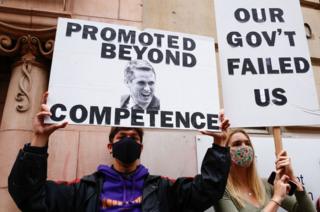 Image copyright
Getty Images
Image caption
Students protested against the downgrading of results outside the Department for Education on Saturday
Image copyright
Getty Images
Image caption
Students protested against the downgrading of results outside the Department for Education on Saturday
The exams regulator is reviewing its guidance on how to appeal against A-level and GCSE grades using mock exam results - hours after publishing it.
On Saturday Ofqual set out what constituted a "valid" mock exam for students appealing against A-level results in England.
But the regulator has now suspended that criteria, and further information will be published "in due course".
Almost 40% of A-level grades were marked down from teachers' predictions.
Neither A-level nor GCSE students were able to sit public exams this year because of the coronavirus pandemic.
The Conservative chairman of the education select committee, Robert Halfon, said the decision to review appeals guidance only announced on Saturday created a "huge mess" that left students and schools in confusion.
Meanwhile, the statistical model used by Ofqual to determine grades faces two legal challenges, which argue students were unfairly judged by the school they attend.
Ofqual said earlier on Saturday that, where a written mock exam was not taken, it would consider other teacher assessments instead.
However, a statement published late on Saturday night on the regulator's website read: "Earlier today we published information about mock exam results in appeals.
"This policy is being reviewed by the Ofqual Board and further information will be published in due course."
BBC political correspondent Jonathan Blake said the Department for Education appeared to be unaware of the change and the review of the criteria was likely to draw further criticism of the government's handling of the exams process in England.
The criteria under which Ofqual would accept a "valid mock assessment", set out on Saturday and then suspended hours later, had been stipulated as:
Supervised, unseen and undertaken in conditions intended to secure the work as the student's own Either past assessments produced by the relevant exam board, or assessments developed by teachers Taken under timed conditions Completed before 20 March 2020, when schools and colleges were closed Marked using a mark scheme provided by the relevant exam board Graded in line with the exam board's examination standardBefore results were released, the Department for Education announced a "triple-lock", which meant that students' final results could take into account their teacher's predicted grade, their mock exam or the option of sitting the actual exam in the autumn.
However, Labour said that, under the new Ofqual criteria, some students would not be able to use their mock results as the basis for an appeal.
Shadow education secretary Kate Green said that the education secretary's promise that students would have the "safety net" of their mock results was "rapidly unravelling".
"The latest chaos is the inevitable consequence of this government's shambolic approach to exams, which saw solutions dreamt up on the back of a cigarette packet and announced barely a day before young people received their results," she said.
Labour is calling for the government to resolve the crisis by giving students the grades assessed by their teachers.
Mr Halfon, the education select committee chairman, said: "Goodness knows what's going on at Ofqual. It sows confusion among pupils, head teachers and school teachers and it's the last thing we need at this time."
He told BBC Breakfast he believed that every student who felt their results were unfair should have the right to appeal if their head teacher agreed.
Legal challenges
Ofqual also faces two judicial review cases, with students challenging what they say is an "irrational, arbitrary" approach.
Student Curtis Parfitt-Ford was awarded his predicted grades but told the BBC he wants to challenge the "completely ridiculous" system.
Image caption Student Curtis Parfitt-Ford intends to challenge Ofqual in the courtsHe said his lawyers, from Leigh Day and Foxglove, believe Ofqual acted outside their statutory responsibilities in basing judgements on schools' prior performance not "individual achievement and attainment".
Six students are also being supported by campaigning legal group the Good Law Project. One of the pupils, named only as Michael, saw his grades fall from a predicted three Bs to three E grades.
"It is abysmal to think that the government, whose job it is to lead this country in the right direction, has allowed an algorithm to determine the futures of thousands of students," he said.
'Not good enough'
Geoff Barton, general secretary of the Association of School and College Leaders, told BBC Breakfast that way grades have been awarded is "simply not good enough".
He added that universities needed to stop being "insular and self-protective" and to "step up", offering places to disadvantaged students who had been downgraded.

Media playback is unsupported on your device
He also called for Ofqual to re-examine extreme cases, such as students downgraded from a teacher-assessed C to a failing U grade.
"Young people, after two years on a course, should really not be coming out with a fail when they haven't had the chance to sit the exam," Mr Barton said.
He said the "really big issue" is what has gone wrong with the statistical model used to determine results and how it might affect GCSEs, where there are larger numbers of disadvantaged students waiting for grades.
The government announced on Friday that schools would not have to pay to appeal against exam grades.

 5 years ago
582
5 years ago
582 

